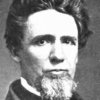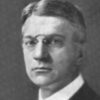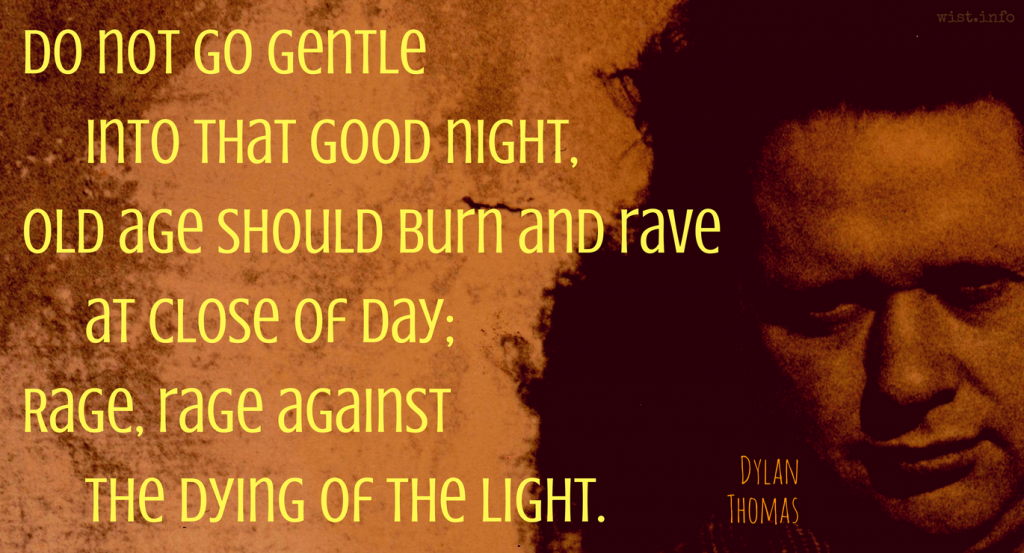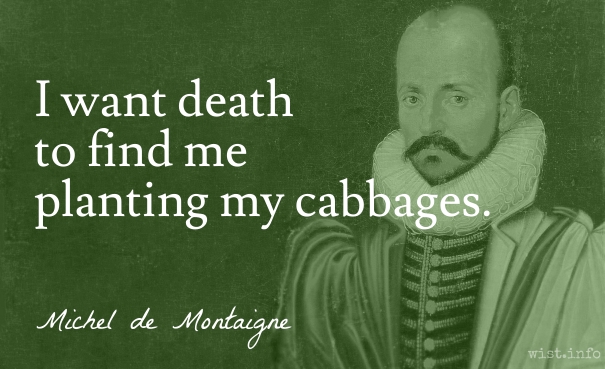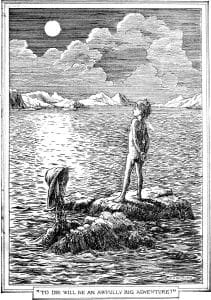Some pirates achieved immortality by great deeds of cruelty or derring-do. Some achieved immortality by amassing great wealth. But the captain had long ago decided that he would, on the whole, prefer to achieve immortality by not dying.
Quotations about:
dying
Note not all quotations have been tagged, so Search may find additional quotes on this topic.
RICHARD: I wasted time, and now doth time waste me.
William Shakespeare (1564-1616) English dramatist and poet
Richard II, Act 5, sc. 5, l. 50 (5.5.50) (1595)
(Source)
In his prison cell.
He is asleep. Though his mettle was sorely tried,
He lived, and when he lost his angel, died.
It happened calmly, on its own,
The way night comes when day is done.[Il dort. Quoique le sort fût pour lui bien étrange,
Il vivait. Il mourut quand il n’eut plus son ange,
La chose simplement d’elle-même arriva,
Comme la nuit se fait lorsque le jour s’en va.]Victor Hugo (1802-1885) French writer
Les Misérables, Part 5 “Jean Valjean,” Book 9 “Supreme Shadow, Surpreme Dawn,” ch. 6 (5.9.6) (1862) [tr. Wilbour/Fahnestock/MacAfee (1987)]
(Source)
These final lines of the book are an epitaph once penciled on the stone over Valjean's unmarked grave. Wilbour and Wraxall leave the lines in French.
(Source (French)). Alternate translations:He sleeps. Although his fate was very strange, he lived. He died when he had no longer his angel. The thing came to pass simply, of itself, as the night comes when day is gone.
[tr. Hapgood (1887)]He sleeps; although so much he was denied,
He lived. And when his dear love left him, died.
It happened of itself, in the calm way
That in the evening night-time follows day.
[tr. Denny (1976)]He sleeps. Though fate dealt with him strangely,
He lived. Bereft of his angel, he died.
It came about simplly, of itself,
As night follows when the day is ended.
[tr. Donougher (2013)]
It is nothing to die; it is horrible not to live.
[Ce n’est rien de mourir; c’est affreux de ne pas vivre.]
Victor Hugo (1802-1885) French writer
Les Misérables, Part 5 “Jean Valjean,” Book 9 “Supreme Shadow, Supreme Dawn,” ch. 5 (5.9.5) [Jean Valjean] (1862) [tr. Wilbour/Fahnestock/MacAfee (1987)]
(Source)
Spoken to Cosette and Marius (and his doctor) as he is dying.
(Source (French)). Alternate translations:It is nothing to die; it is frightful not to live.
[tr. Wilbour (1862)]It is nothing to die, but it is frightful not to live.
[tr. Wraxall (1862)]It is nothing to die; it is dreadful not to live.
[tr. Hapgood (1887)]To die is nothing; but it is terrible not to live.
[tr. Denny (1976)]It’s nothing to die. It’s dreadful not to live.
[tr. Donougher (2013)]
Fear makes us blind, and we touch each fear with all the avid curiosity of self-interest, trying to make a whole out of a hundred parts, like the blind men with their elephant.
We sense the shape. Children grasp it easily, forget it, and relearn it as adults. The shape is there, and most of us come to realize what it is sooner or later: it is the shape of a body under a sheet. All our fears add up to one great fear, all our fears are part of that great fear — an arm, a leg, a finger, an ear. We’re afraid of the body under the sheet. It’s our body. And the great appeal of horror fiction through the ages is that it serves as a rehearsal for our own deaths.
Being over seventy is like being engaged in a war. All our friends are going or gone and survive amongst the dead and the dying as on a battlefield.
Muriel Spark (1918–2006) Scottish writer, poet, essayist
Memento Mori, ch. 4 [Miss Jean Taylor] (1959)
(Source)
PETER: Her light is growing faint, and if it goes out, that means she is dead! Her voice is so low I can scarcely tell what she is saying. She says — she says she thinks she could get well again if children believed in fairies!
(He rises and throws out his arms he knows not to whom, perhaps to the boys and girls of whom he is not one.)
Do you believe in fairies? Say quick that you believe! If you believe, clap your hands!
(Many clap, some don’t, a few hiss. Then perhaps there is a rush of Nanas to the nurseries to see what on earth is happening. But TINK is saved.)
Oh, thank you, thank you, thank you! And now to rescue Wendy!
(TINK is already as merry and impudent as a grig, with not a thought for those who have saved her.J. M. Barrie (1860-1937) Scottish novelist and dramatist [James Matthew Barrie]
Peter Pan, Act 4 (1904, pub. 1928)
(Source)
In Barrie's 1911 novelization, Peter and Wendy, ch. 13 "Do You Believe in Fairies?" this is rendered:Every moment her light was growing fainter; and he knew that if it went out she would be no more. She liked his tears so much that she put out her beautiful finger and let them run over it. Her voice was so low that at first he could not make out what she said. Then he made it out. She was saying that she thought she could get well again if children believed in fairies.
Peter flung out his arms. There were no children there, and it was night time; but he addressed all who might be dreaming of the Neverland, and who were therefore nearer to him than you think: boys and girls in their nighties, and naked papooses in their baskets hung from trees.
“Do you believe?” he cried.
Tink sat up in bed almost briskly to listen to her fate.
She fancied she heard answers in the affirmative, and then again she wasn’t sure.
“What do you think?” she asked Peter.
“If you believe,” he shouted to them, “clap your hands; don’t let Tink die.”
Many clapped.
Some didn’t.
A few little beasts hissed.
The clapping stopped suddenly; as if countless mothers had rushed to their nurseries to see what on earth was happening; but already Tink was saved. First her voice grew strong, then she popped out of bed, then she was flashing through the room more merry and impudent than ever. She never thought of thanking those who believed, but she would have liked to get at the ones who had hissed.
When you take the wires of the cage apart, you do not hurt the bird, but help it. You let it out of its prison. How do vou know that death does not help me when it takes the wires of my cage down? — that it does not release me, and put me into some better place, and better condition of life?
Randolph S. Foster (1820-1903) American Methodist Episcopal bishop, preacher, educator
“Man a Spiritual Being,” Lecture 2, Chautauqua, New York (1878)
(Source)
Collected in his Beyond the Grave: Being Three Lectures Before Chautauqua Assembly in 1878 (1879).
Poor fool, what makes you promise yourself a long life, when there is not a day of it that goes by in security? Again and again, people who looked forward to a long life have been caught out over it, called away quite unexpectedly from this bodily existence. Nothing commoner than to be told, in the course of conversation, how such a man was stabbed, such a man was drowned; how one fell from a height and broke his neck, another never rose from table, another never finished his game of dice. Fire and sword, plague and murderous attack, it is always the same thing — death is the common end that awaits us all, and life can pass suddenly, like a shadow when the sun goes in.
[Ha stulte, quid cogitas te diu victurum, cum nullum diem habeas securum? Quam multi decepti sunt et insperati de corpore extracti! Quoties audisti a dicentibus, quia ille gladio cecidit, ille submersus est, ille ab alto ruens cervicem fregit, ille manducando obriguit, ille ludendo finem fecit, alius igne, alius ferro, alius peste, alius latrocinio interiit: et sic omnium finis mors est, et vita hominum tanquam umbra cito pertransit.]Thomas à Kempis (c. 1380-1471) German-Dutch priest, author
The Imitation of Christ [De Imitatione Christi], Book 1, ch. 23, v. 7 (1.23.7) (c. 1418-27) [tr. Knox-Oakley (1959)]
(Source)
(Source (Latin)). Alternate translations:Thou art a fool, if thou think to live long, sith thou art not sure to live one day to the end. How many have been deceived through trust of long life, and suddenly have been taken out of this world or they had thought. How oft hast thou heard say that such a man was slain, and such a man was drowned, and such a man fell and broke his neck ? This man as he ate his meat was strangled, and this man as he played took his death ; one with fire, another with iron, another with sickness, and some by theft have suddenly perished ! And so the end of all men is death, for the life of man as a shadow suddenly fleeth and passeth away.
[tr. Whitford/Raynal (1530/1871)]You are foolish if you think to live long, since you are not certain to live one day through to the end. How many have been deceived through trusting in a long life who have suddenly been taken out of the world much sooner than they had thought. How often have you heard that such a man was slain, and such a man was drowned, and such a man fell and broke his neck; this man choked on his food, and this man died in his recreation; one by fire, another by the sword, another by sickness, and some by theft have suddenly perished. And so the end of all men is death, and the life of man is as a shadow which suddenly glides and passes away.
[tr. Whitford/Gardiner (1530/1955)]Ah foole, why dost thou think to live long, when thou canst not promise to thy selfe one day, how many have been deceived and suddenly snatcht away? How often dost thou hear these reports, such a man is slain, another is drowned, a third breaks his neck with a fall, this man died eating, and that man playing? One perished by fire, another by the sword, another of the plague, and another was slain by theeves, thus death is the end of all, and mans life passeth away like a shadow.
[tr. Page (1639), 1.23.29-31]Does any Confidence of long Life encourage you to defer putting this good Advice in Execution speedily ? Nay, but reflect, fond Man, how little you can promise your self one poor single Day. How many Instances have you before your Eyes, or fresh in your Remembrance, of Persons miserably deluded and disappointed in this Hope, and hurried out of the Body without any warning at all? How often have you been surprized with the News of this Friend being run thro', another drowning crossing the Water, a Third breaking his Neck by a Fall, a Fourth fallen down dead at Table, or choaked with his Meat, a Fifth seized with an Apoplex at Play, a Sixth burnt in his Bed, a Seventh murthered, an Eighth killed by Thieves, a Ninth struck with Lightning, or Blasting, or Pestilence, a Tenth swallow'd up in an Earthquake. Such vast variety of Deaths surround us, and so fleeting a Shadow is the Life of a Man.
[tr. Stanhope (1696; 1706 ed.)]Ah foolish man! why dost thou still flatter thyself with the expectation of a long life, when thou canst not be sure of a single day? How many unhappy fools, deluded by this hope, are in some unexpected moment separated from the body! How often dost thou hear, that one is slain, another is drowned, another by falling from a precipice has broken his neck, another is choaked in eating, another has dropt down dead in the exercise of some favorite diversion; and that thousands, indeed, are daily perishing by fire, by sword, by the plague, or by the violence of robbers! Thus is death common to every age; and man suddenly passeth away as a vision of the night.
[tr. Payne (1803), 1.23.8]Ah! fool, why dost thou think to live long, when thou canst not promise to thyself one day. How many have been deceived and suddenly snatched away! How often dost thou hear these reports, Such a man is slain, another man is drowned, a third breaks his neck with a fall from some high place, this man died eating, and that man playing! One perished by fire, another by the sword, another of the plague, another was slain by thieves. Thus death is the end of all, and man's life suddenly passeth away like a shadow.
[ed. Parker (1841)]Ah, foolish man! why dost thou think thou wilt live long, when thou canst not count upon a single day? How many souls, deluded by this hope, are, in some unexpected moment, separated from the body! How often dost thou hear, that "one is slain, another is drowned, another, by falling form a precipice, has broken his neck -- another is choaked in eating; another has dropt down dead in the exercise of some favourite diversion; and that thousands, indeed, are daily perishing by fire, by sword, by the plague, or by the violence of robbers! Thus, death is the end of all; and the life of man passeth away suddenly like a shadow.
[tr. Dibdin (1851)]Ah, fool! why dost thou think to live long, when thou art not sure of one day? How many thinking to live long have been deceived, and snatched unexpectedly away? How often hast thou heard related, that such a one was slain by the sword; another drowned; another, from a height, broke his neck; one died eating, another playing? Some have perished by fire; some by the sword; some by pestilence; and some by robbers. And so death is the end of all; and man's life suddenly passeth away like a shadow.
[ed. Bagster (1860)]Ah, foolish one! why thinkest thou that thou shalt live long, when thou art not sure of a single day? How many have been deceived, and suddenly have been snatched away from the body! How many times hast thou heard how one was slain by the sword, another was drowned, another falling from on high broke his neck, another died at the table, another whilst at play! One died by fire, another by the sword, another by the pestilence, another by the robber. Thus cometh death to all, and the life of men swiftly passeth away like a shadow.
[tr. Benham (1874)]Ah! fool, why dost thou think to live long, when thou canst not promise to thyself one day. How many have been deceived and suddenly snatched away! How often dost thou hear these reports, Such a man is slain, another is drowned, a third has broken his neck with a fall, this man died eating, and that man playing! One perished by fire, another by the sword, another by the plague, another was slain by thieves. Thus death is the end of all, and man's life suddenly passeth away like a shadow.
[tr. Anon. (1901)]Ah, foolish man, why do you plan to live long when you are not sure of living even a day? How many have been deceived and suddenly snatched away! How often have you heard of persons being killed by drownings, by fatal falls from high places, of persons dying at meals, at play, in fires, by the sword, in pestilence, or at the hands of robbers! Death is the end of everyone and the life of man quickly passes away like a shadow.
[tr. Croft/Bolton (1940)]Ah fool, why think of living long when you have no certainty of a day? How many are mistaken and unexpectedly snatched away from the body. How often you have heard men say, he is killed by the sword, he is drowned, he broke his neck falling from a height, he choked while eating, he met his end while at play; one perished by fire, another from plague, another by a robber; and so death is the end of all; and man’s life passes suddenly like a shadow.
[tr. Daplyn (1952)]Foolish man, how can you promise yourself a long life, when you are not certain of a single day? How many have deceived themselves in this way, and been snatched unexpectedly from life! You have often heard how this man was slain by the sword; another drowned; how another fell from a high place and broke his neck; how another died at table; how another met his end in play. One perishes by fire, another by the sword, another from disease, another at the hands of robbers. Death is the end of all men; and the life of man passes away suddenly as a shadow.
[tr. Sherley-Price (1952)]You fool, why do you imagine you will live a long life. when you cannot be sure of a single day? Many have made this mistake and have been snatched away from life when they least expected it. So often you hear people saying that so and so has been killed in battle, and so and so drowned; another man has fallen from a height and broken his neck; one choked over a meal, another met his end in some sport. Others have died by -- fire, by violence, by sickness, by robbery -- death is the end of all, and the life of man passes by and vanishes like a shadow.
[tr. Knott (1962)]Foolish one, why do you hope for long life when not even one day is certain? How many there are who think they will live long, but are mistaken and snatched from the body unexpectedly. How often have you heard it said: This man fell by the sword; that man was drowned; another fell and broke his neck; yet another was taken while at table and the other was at sport when the end came. One by fire, another by steel, yet another by pestilence and again another by thieves met his death. Death is the end of all men and man’s life is a shadow that quickly passes by.
[tr. Rooney (1979)]Ah, my foolish friend! why do you think of living a long life when you are not sure of even one day? How many people are tricked and unexpectedly snatched away? How often have you heard it said that someone was murdered, someone else drowned, another broke his neck falling from a high place, yet another choked while eating, and someone else met his end while playing; one person died by fire, another from disease, and another was killed by a robber, and thus death is the end of all, and our life passes suddenly like a shadow.
[tr. Creasy (1989)]
Life, struck sharp on death,
Makes awful lightning.Elizabeth Barrett Browning (1806-1861) English poet
Aurora Leigh, Book 1, ll. 210–211 (1856)
(Source)
In short, I consider this world as a place which nature never designed for my permanent abode, and I look upon my departure out of it, not as being driven away from my habitation, but as leaving my inn.
[Et ex vita ita discedo tamquam ex hospitio, non tamquam e domo; commorandi enim natura devorsorium nobis, non habitandi dedit.]
Marcus Tullius Cicero (106-43 BC) Roman orator, statesman, philosopher
De Senectute [Cato Maior; On Old Age], ch. 23 / sec. 84 (23.84) (44 BC) [tr. Melmoth (1773)]
(Source)
(Source (Latin)). Alternate translations:I departe me from this presente life as a walkyng weyfaryng man or as a voyagieng pilgryme departith from some lodgyng place or an hostellrye for to come to his owne dwellyng house. But I departe me not from this life as the lorde departeth from his owne house for this passable life is nowght ellys but as a lodgyng place or an hostellrye.
[tr. Worcester/Worcester/Scrope (1481)]And I depart out of this life as out of an inn, and not out of a dwellinghouse. For nature hath given to us a lodging to remain and sojourn in for a time, and not to dwell in continually.
[tr. Newton (1569)]And I depart out of this life, as from an Inne, not as from a continuall habitation; for nature hath given us a place to rest in, not to dwell in.
[tr. Austin (1648)]Hence from an Inne, not from my home, I pass,
Since Nature meant us here no dwelling place.
[tr. Denham (1669)]I have not frustrated the End of Nature, and am disposed to leave this life, with as much Indifference, as an Inn upon the Road; for Nature here intends us a Lodging only, not a Fixed Home or Settled Place of Habitation.
[tr. Hemming (1716)]And now I go from this Life as from an Inn; for Nature hath given it us as a Place to rest in, but not for a continual Habitation.
[tr. J. D. (1744)]And when the Close comes, I shall quit Life as I would an Inn, and not as a real Home. For Nature appears to me to have ordain'd this Station here for us, as a Place of Sojournment, a transitory Abode only, and not as a fixt Settlement or permanent Habitation.
[tr. Logan (1744)]I depart out of life just as out of an inn, and not as out of my home. For Nature has given us an hotel to sojourn in, not a place to dwell in.
[Cornish Bros. ed. (1847)]And from this life I depart as from a temporary lodging, not as from a home. For nature has assigned it to us as an inn to sojourn in, not a place of habitation.
[tr. Edmonds (1874)]Yet I depart from life, as from an inn, not as from a home; for nature has given us here a lodging for a sojourn, not a place of habitation.
[tr. Peabody (1884)]But I quit life as I would an inn, not as I would a home. For nature has given us a place of entertainment, not of residence.
[tr. Shuckburgh (1895)]I now depart
As from a lodging; house, and not a home.
Nature has made this world a place in which
One stays a little, does not dwell for aye.
[tr. Allison (1916)]And I quit life as if it were an inn, not a home. For Nature has given us an hostelry in which to sojourn, not to abide.
[tr. Falconer (1923)]But what nature gives us is a place to dwell in temporarily, not one to make our own. When I leave life, therefore, I shall feel as if I am leaving a hostel rather than a home.
[tr. Grant (1960, 1971 ed.)]And I am departing from life as from a temporary lodging, not as from a home. Yes, nature has given a spot where we may turn aside for a time, not a place of permanent residence.
[tr. Copley (1967)]But I do feel as though I am leaving an inn, not my home. Nature has given us a place to stay for a while, but not for ever.
[tr. Cobbold (2012)]I leave this life as I would leave
An inn and not a home. Nature
Gave us in fact a temporary hotel,
Not a permanent place in which to dwell.
[tr. Bozzi (2015)]I depart from life as if from an inn, not a house. Nature gives us our bodies to abide in only for a time as guests, not to make our home.
[tr. Freeman (2016)]And I am leaving life as if from an inn, not a home. For nature has given us a way-station for a brief delay, not to permanently reside.
[tr. @sentantiq (2018)]
When an illness is incurable and painful, and makes useful activity impossible, it is mere cruelty to prolong life; at any rate if the sufferer is anxious to die, or has lost his reason. The prolongation of his life can be neither a happiness to himself nor a benefit to society, and is therefore equally unjustified from the standpoint of the individual and from that of the community.
Bertrand Russell (1872-1970) English mathematician and philosopher
“On Euthanasia,” New York American (1934-01-01)
(Source)
MALCOLM: Nothing in his life
Became him like the leaving it. He died
As one that had been studied in his death
To throw away the dearest thing he owed
As ’twere a careless trifle.William Shakespeare (1564-1616) English dramatist and poet
Macbeth, Act 1, sc. 4, l. 8ff (1.4.8-12) (1606)
(Source)
Most persons have died before they expire — died to all earthly longings, so that the last breath is only, as it were, the locking of the doors of the already deserted mansion.
I have lived a life. I’ve journeyed through
the course that Fortune charted for me. And now
I pass to the world below, my ghost in all its glory.[Vixi, et, quem dederat cursum Fortuna, peregi;
Et nunc magna mei sub terras ibit Imago.]Virgil (70-19 BC) Roman poet [b. Publius Vergilius Maro; also Vergil]
The Aeneid [Ænē̆is], Book 4, l. 653ff (4.653-654) [Dido] (29-19 BC) [tr. Fagles (2006)]
(Source)
Dido's deathbed statement.
(Source (Latin)). Alternate translations:I have
Liv'd, and perform'd that course my fortune gave,
And now the earth must my great shade seclude.
[tr. Ogilby (1649)]My fatal course is finish'd; and I go,
A glorious name, among the ghosts below.
[tr. Dryden (1697)]I have lived, and finished the race which fortune gave me. And now my ghost shall descent illustrious to the shades below.
[tr. Davidson/Buckley (1854)]My life is lived, and I have played
The part that Fortune gave,
And now I pass, a queenly shade,
Majestic to the grave.
[tr. Conington (1866)]I have lived,
And have achieved the course that fortune gave.
And now of me the queenly shade shall pass
Beneath the earth.
[tr. Cranch (1872), l. 855ff]I have lived and fulfilled Fortune's allotted course; and now shall I go a queenly phantom under the earth.
[tr. Mackail (1885)]I, I have lived, and down the way fate showed to me have passed;
And now a mighty shade of me shall go beneath the earth!
[tr. Morris (1900)]My life is lived; behold, the course assigned
By Fortune now is finished, and I go,
A shade majestic, to the world below.
[tr. Taylor (1907), st. 86, l 768ff]My life is done.
I have accomplished what my lot allowed;
and now my spirit to the world of death
in royal honor goes.
[tr. Williams (1910)]My life is done and I have finished the course that Fortune gave; and now in majesty my shade shall pass beneath the earth.
[tr. Fairclough (1916)]I have lived, I have run the course that fortune gave me,
And now my shade, a great one, will be going
Below the earth.
[tr. Humphries (1951)]I have lived, I have run to finish the course which fortune gave me:
And now, a queenly shade, I shall pass to the world below.
[tr. Day-Lewis (1952)]I have lived
and journeyed through the course assigned by fortune.
And now my Shade will pass, illustrious,
beneath the earth.
[tr. Mandelbaum (1971), l. 900ff]I have lived my life out to the very end
And passed the stages Fortune had appointed.
Now my tall shade goes to the under world.
[tr. Fitzgerald (1981), l. 907ff]I have lived my life and completed the course that Fortune has set before me, and now my great spirit will go beneath the earth.
[tr. West (1990)]I have lived, and I have completed the course that Fortune granted,
and now my noble spirit will pass beneath the earth.
[tr. Kline (2002)]I have lived, and I have completed the course
Assigned by Fortune. Now my mighty ghost
Goes beneath the earth.
[tr. Lombardo (2005)]I'm done with life; I've run the course Fate gave me.br> Now my noble ghost goes to the Underworld.
[tr. Bartsch (2021)]
It takes more courage to live than to die; which is proved by the fact that so many more men die well than live well.
William Lyon Phelps (1865-1943) American educator and critic
Representative Plays by J. M. Barrie, Introduction, § 2 (1926)
(Source)
The brave dies perhaps two thousand deaths if he’s intelligent. He simply doesn’t mention them.
Ernest Hemingway (1899-1961) American writer
A Farewell to Arms, ch. 21 [Catherine] (1929)
(Source)
Referring to a common paraphrase of Shakespeare's Julius Caesar (2.2.34) "The coward dies a thousand deaths, the brave but one."
For the world, I count it not an Inne, but an Hospitall, and a place, not to live, but to die in.
Thomas Browne (1605-1682) English physician and author
Religio Medici, Part 2, sec. 11 (1643)
(Source)
It’s a blessing to die for a cause, because you can so easily die for nothing.
Andrew Young (b. 1932) American politician, diplomat, activist
Interview by Peter Ross Range, Playboy (Jul 1977)
(Source)
Some things are fairly obvious when it’s a seven-foot skeleton with a scythe telling you them.
He bent drooping his head to one side, as a garden poppy
bends beneath the weight of its yield and the rains of springtime;
so his head bent slack to one side beneath the helm’s weight.[Μήκων δ’ ὡς ἑτέρωσε κάρη βάλεν, ἥ τ’ ἐνὶ κήπῳ
καρπῷ βριθομένη νοτίῃσί τε εἰαρινῇσιν,
ὣς ἑτέρωσ’ ἤμυσε κάρη πήληκι βαρυνθέν.]Homer (fl. 7th-8th C. BC) Greek author
The Iliad [Ἰλιάς], Book 8, l. 306ff (8.306-308) (c. 750 BC) [tr. Lattimore (1951)]
(Source)
Describing the death of Gorgythion, son of Priam.
Alt. trans.:And, as a crimson poppy flow’r, surchargéd with his seed,
And vernal humours falling thick, declines his heavy brow,
So, of one side, his helmet’s weight his fainting head did bow.
[tr. Chapman (1611), ll. 265-67]As full-blown poppies, overcharged with rain,
Decline the head, and drooping kiss the plain, --
So sinks the youth; his beauteous head, depressed
Beneath his helmet, drops upon his breast.
[tr. Pope (1715-20)]As in the garden, with the weight surcharged
Of its own fruit, and drench’d by vernal rains
The poppy falls oblique, so he his head
Hung languid, by his helmet’s weight depress’d.
[tr. Cowper (1791), l. 351ff]And as a poppy, which in the garden is weighed down with fruit and vernal showers, droops its head to one side, so did his head incline aside, depressed by the helmet.
[tr. Buckley (1860)]Down sank his head, as in a garden sinks
A ripen'd poppy charg'd with vernal rains;
So sank his head beneath his helmet's weight.
[tr. Derby (1864), ll. 349-51]Now he bowed his head as a garden poppy in full bloom when it is weighed down by showers in spring -- even thus heavy bowed his head beneath the weight of his helmet.
[tr. Butler (1898)]And he bowed his head to one side like a poppy that in a garden is laden with its fruit and the rains of spring; so bowed he to one side his head, laden with his helmet.
[tr. Murray (1924)]Fallen on one side, as on the stalk a poppy falls, weighed down by showring spring, beneath his helmet's weight his head sank down.
[tr. Fitzgerald (1974)]As a garden poppy, burst into red bloom, bends
by its full seeds and a sudden spring shower,
so Gorgythion's head fell limp over one shoulder,
weighed down by his helmet.
[tr. Fagles (1990), ll. 349-53]Off to one side his head he let drop, like a poppy that in some
garden is heavy with its own seed and the showers of springtime --
so to one side did his head incline, weighed down by his helmet.
[tr. Merrill (2007), ll. 306-08]
Trust me, the being-dead part is much easier than the dying part. If you can watch much television, then being dead will be a cinch. Actually, watching television and surfing the Internet are really excellent practice for being dead.
Oh, let it be a night of lyric rain
And singing breezes, when my bell is tolled.
I have so loved the rain that I would hold
Last in my ears its friendly, dim refrain.Dorothy Parker (1893-1967) American writer, poet, wit
“Testament,” Not So Deep as a Well (1936)
(Source)
There’s nothing noble about dying. Not even if you die for honor. Not even if you die the greatest hero the world ever saw. Not even if you’re so great your name will never be forgotten and who’s that great? The most important thing is your life, little guys. You’re worth nothing dead except for speeches. Don’t let them kid you any more. Pay no attention when they tap you on the shoulder and say come along we’ve got to fight for liberty, or whatever their word is. There’s always a word.
Dalton Trumbo (1905-1976) American screenwriter and novelist [James Dalton Trumbo]
Johnny Got His Gun (1938)
(Source)
Dying is an art.
Like everything else,
I do it exceptionally well.
I do it so it feels like hell.
I do it so it feels real.
I guess you could say I have a call.
Do not go gentle into that good night,
Old age should burn and rave at close of day;
Rage, rage against the dying of the light.Dylan Thomas (1914-1953) Welsh poet and writer
“Do Not Go Gentle into That Good Night” (1947)
(Source)
First published in Botteghe Oscure (Nov 1951).
What sort of a lover am I to think so much about my affliction and so much less about hers? Even the insane call, ‘Come back,’ is all for my own sake. I never even raised the question whether such a return, if it were possible, would be good for her. I want her back as an ingredient in the restoration of my past. Could I have wished her anything worse? Having got once through death, to come back and then, at some later date, have all her dying to do over again? They call Stephen the first martyr. Hadn’t Lazarus the rawer deal?
Remember, though we struggle against things because we are afraid of them, it is often the other way round — we get afraid because we struggle. Are you struggling, resisting? Don’t you think Our Lord says to you ‘Peace, child, peace. Relax. Let go. Underneath are the everlasting arms. Let go, I will catch you. Do you trust me so little?’ Of course, this may not be the end. Then make it a good rehearsal.
A Good life fears not Life nor Death.
Thomas Fuller (1654-1734) English physician, preacher, aphorist, writer
Gnomologia: Adages and Proverbs (compiler), # 157 (1732)
(Source)
The glorious and the decent way of dying
Is for one’s country. Run, and death will seize
You no less surely. The young coward, flying,
Gets his quietus in the back and knees.
[Dulce et decorum est pro patria mori:
mors et fugacem persequitur virum
nec parcit inbellis iuventae
poplitibus timidoque tergo.]Horace (65–8 BC) Roman poet, satirist, soldier, politician [Quintus Horatius Flaccus]
Odes [Carmina], Book 3, # 2, l. 13ff (3.2.13-16) (23 BC) [tr. Michie (1963)]
(Source)
The first line is often translated as "It is sweet and fitting to die for one’s country." While dulce et decorum is often in the modern era (World War I and beyond) dismissed as murderous, meaningless brainwashing, the rest of the quatrain clarifies that death comes to the courageous and cowardly alike; that dishonorable flight does not ensure safety.
Though it's worth noting that Horace wrote of abandoning his shield and fleeing at the Battle of Philippi.
The ode as a whole is about training young Roman men in discipline and courage.
(Source (Latin)). Alternate translations:It is a sweet, and noble gain,
In Countreys quarrel to be slain.
Death the swift flying man pursues
With ready steps: Nor doth he use
To spare from unavoided wrack,
Youths supple hams, or fearful back.
[tr. Sir T. H.; ed. Brome (1666)]He nobly Bleeds, he bravely Dies,
That falls his Countries Sacrifice;
The flying Youth swift Fate o're takes
It strikes them thro the trembling backs,
And runs too fast for nimble Cowardice.
[tr. Creech (1684)]What joy, for fatherland to die!
Death's darts e'en flying feet o'ertake,
Nor spare a recreant chivalry,
A back that cowers, or loins that quake.
[tr. Conington (1872)]It is sweet and glorious to die for one’s country; death even pursues the man that flies from him; nor does he spare the trembling knees of effeminate youth, nor the coward back.
[tr. Smart/Buckley (1853)]For our dear native land to die
Is glorious and sweet;
And death the coward slaves that fly
Pursues with steps as fleet.
Nor spares the loins and backs of those
Unwarlike youths, who shun their foes.
[tr. Martin (1864)]Glorious and sweet it is to die for the dear native land;
Even him who runs away from Death, Death follows fast behind --
Death does not spare the recreant back,
And hamstrings limbs that flee.
[tr. Bulwer-Lytton (1870)]Sweet and glorious it is to die for our country. Death also pursues the runaway, and spares not the legs and trembling back of the unwarlike youth.
[tr. Elgood (1893)]'T is sweet for native land to die,
'T is noble: Death takes them that fly:
For coward back it has no ruth,
Nor spares the flight of dastard youth.
[tr. Gladstone (1894)]'Tis sweet and noble -- Death for one's country's sake --
Death overtakes the cowardly fugitive.
Nor spares his flying limbs, and timid
Back, as he runs from the foe dishonour'd.
[tr. Phelps (1897)]'Tis sweet and honourable to die for fatherland.
Death follows even the man who flees.
And of unwarlike youth
Spares not the loins and recreant back.
[tr. Garnsey (1907)]Good 'tis and fine, for fatherland to die!
Death tracks him too who shirks; nor will He fail
To smite the coward loins that quail,
The coward limbs that fly!
[tr. Marshall (1908)]'Tis sweet and glorious to die for fatherland. Yet Death o’ertakes not less the runaway, nor spares the limbs and coward backs of faint-hearted youths.
[tr. Bennett (Loeb) (1912)]To die for Homeland is a sweet
And gracious thing; on flying feet
Death presses hard, nor spares to smite
Poltroons' weak knees and backs affright.
[tr. Mills (1924)]How good, how noble to die for your country.
Death chases those who run from him,
And catches them, sand never spares a coward
Or a womanish boy.
[tr. Raffel (1983)]Sweet and proper it is to die for your country,
But Death would just as soon come after him
Who runs away; Death gets him by the backs
Of his fleeing knees and jumps him from behind.
[tr. Ferry (1997)]Sweet and noble is it to die for one’s country, yet Death pursues even the man who flees, nor does he spare the languid loins and cowardly backs of pusillanimous youth.
[tr. Alexander (1999)]It’s sweet and fitting to die for one’s country.
Yet death chases after the soldier who runs,
and it won’t spare the cowardly back
or the limbs, of peace-loving young men.
[tr. Kline (2015)]It is sweet and proper to die for your country:
Death, too, pursues the runaway man
And does not spare the knees of a peaceful youth
nor a fearful back.
[tr. Wikisource (2021)]
I want a man to act, and to prolong the functions of life as long as he can; and I want death to find me planting my cabbages, but careless of death, and still more of my unfinished garden.
[Je veux qu’on agisse, et qu’on allonge les offices de la vie, tant qu’on peut: et que la mort me trouve plantant mes choux ; mais nonchallant d’elle, et encore plus de mon jardin imparfait.]
Michel de Montaigne (1533-1592) French essayist
Essays, Book 1, ch. 19 (1.19), “That to Philosophize Is to Learn to Die [Que Philosopher, c’est apprendre à mourir]” (1572-03) [tr. Frame (1943)]
(Source)
Published in the 1580 ed.; the second clause (on prolonging the normal activities of life as long as possible) was added in the 1595 ed.
(Source (French)). Alternate translations:I would have a man to be doing, and to prolong his lives offices, as much as lieth in him, and let death seize upon me, whilst I am setting my cabiges, carelesse of her darte, but more of my unperfect garden.
[tr. Florio (1603)]I would always have a man to be doing, and, as much as in him lies, to extend, and spin out the Offices of life; and then let Death take me planting Cabages, but without any careful thought of him, and much less of my Garden’s not being finished.
[tr. Cotton (1686)]I would always have a man to be doing, and spinning out the offices of life as far as possible; and though death should seize me planting my cabbages, I should not be concerned at it, much less for leaving my garden unfinished.
[tr. Friswell (1868)]I would always have a man to be doing, and, as much as in him lies, to extend and spin out the offices of life; and then let death take me planting my cabbages, indifferent to him, and still less of my gardens not being finished.
[tr. Cotton/Hazlitt (1877)]I desire that a man should act, and prolong the employments of life as long as he can, and that death may find me planting my cabbages, but indifferent regarding it, and even more regarding my unfinished garden.
[tr. Ives (1925)]I want death to find me planting my cabbages, but caring little for it, and even less about the imperfections of my garden.
[tr. Rat (1958)]I want us to be doing things, prolonging life’s duties as much as we can; I want Death to find me planting my cabbages, neither worrying about it nor the unfinished gardening.
[tr. Screech (1987)]I wish for us to be doing, and to carry on with our responsibilities in life while we still can. I want death to find me planting my cabbages, indifferent to it, with my garden still a work in progress.
[tr. HyperEssays (2024)]
It’s not that I’m afraid to die. I just don’t want to be there when it happens.
Woody Allen (b. 1935) American comedian, writer, director [b. Allan Steward Konigsberg]
“Death (A Play)”, Without Feathers (1975)
I cannot forgive my friends for dying; I do not find these vanishing acts of theirs at all amusing.
Logan Pearsall Smith (1865-1946) American-English essayist, editor, anthologist
Afterthoughts, ch. 2 “Age and Death” (1931)
(Source)
If being a kid is about learning how to live, then being a grown-up is about learning how to die.
While we have the gift of life, it seems to me the only tragedy is to allow part of us to die — whether it is our spirit, our creativity, or our glorious uniqueness.
Gilda Radner (1946-1989) American comedian
It’s Always Something, ch. 9 “The Wellness Community” (1989)
(Source)
If you don’t know how to die, don’t worry; Nature will tell you what to do on the spot, fully and adequately. She will do this job perfectly for you; don’t bother your head about it.
[Si vous ne sçavez pas mourir, ne vous chaille, nature vous en informera sur le champ, plainement & suffisamment, elle fera exactement cette besongne pour vous, n’en empeschez vostre soing.]
Michel de Montaigne (1533-1592) French essayist
Essays, Book 3, ch. 12 (3.12), “Of Physiognomy [De la Physionomie] (c. 1588) [tr. Frame (1943)]
(Source)
This essay, including this passage, first appeared in the 2nd (1588) edition.
(Source (French)). Alternate translations:If you know not how to die, take no care for it; Nature her selfe will fully and sufficiently teach you in the nicke, she will exactly discharge that worke for you; trouble not your selfe with it.
[tr. Florio (1603)]If yon know not how to die, never trouble your self; Nature will fully and sufficiently instruct you upon the place, she will exactly do that Business for you, take you no Care.
[tr. Cotton (1686)]If you know not how to die, never trouble yourself; nature will, at the time, fully and sufficiently instruct you: she will exactly do that business for you; take you no care.
[tr. Cotton/Hazlitt (1877)]If you know not how to die, be not concerned: Nature will instruct you on the spot, plainly and sufficiently; she will do this business for you accurately; do not give it your attention.
[tr. Ives (1925)]If you do not know how to die, never mind. Nature will give you full and adequate instruction on the spot. She will do this job for you neatly; do not worry yourself with the thought.
[tr. Cohen (1958)]If you do not know how to die, never mind. Nature will tell you how to do it on the spot, plainly and adequately. She will do this job for you most punctiliously: do not worry about it: [tr. Screech (1987)]
Live as you will wish to have lived when you are dying.
[Lebe, wie Du, wenn du stirbst, / Wunschen wirst, gelebt zu haben.]
Christian Gellert (1715-1769) German poet, moralist
Geistliche Oden und Lieder, “Vom Tode” (1757)
PETER: To die will be an awfully big adventure.
J. M. Barrie (1860-1937) Scottish novelist and dramatist [James Matthew Barrie]
Peter Pan, Act 3 (1904, pub. 1928)
(Source)
This was added to the play in 1905, at the end of Act 3:(The waters are lapping over the rock now, and PETER knows that it will soon be submerged. Pale rays of light mingle with the moving clouds, and from the coral grottoes is to be heard a sound, at once the most musical and the most melancholy in the Never Land, the mermaids calling to the moon to rise. PETER is afraid at last, and a tremor runs through him, like a shudder passing over the lagoon; but on the lagoon one shudder follows another till there are hundreds of them, and he feels just the one.)
PETER (with a drum beating in his breast as if he were a real boy at last): To die will be an awfully big adventure.In Barrie's novelization, Peter and Wendy, ch. 8 "The Mermaids' Lagoon" (1911), this is rendered:
The rock was very small now; soon it would be submerged. Pale rays of light tiptoed across the waters; and by and by there was to be heard a sound at once the most musical and the most melancholy in the world: the mermaids calling to the moon.
Peter was not quite like other boys; but he was afraid at last. A tremor ran through him, like a shudder passing over the sea; but on the sea one shudder follows another till there are hundreds of them, and Peter felt just the one. Next moment he was standing erect on the rock again, with that smile on his face and a drum beating within him. It was saying, “To die will be an awfully big adventure.”
Sometimes given as "To die would be an awfully great adventure," "To die will be a great adventure," or "To die would be a great adventure."








